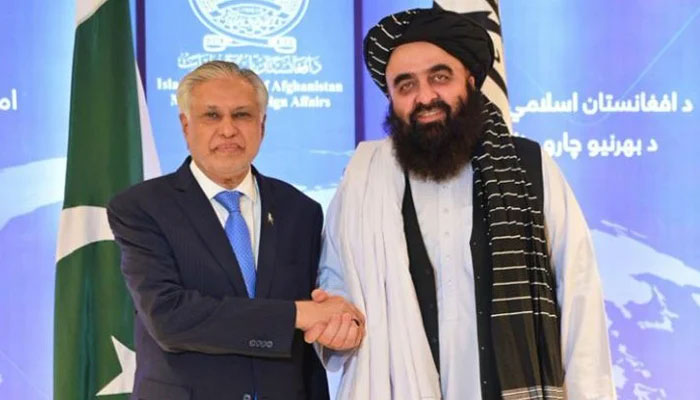Pak-Afghan ties
Continued engagement between the two neighbours could eventually yield positive outcomes
Foreign Minister Ishaq Dar undertook his first official visit to Kabul on Saturday, where Pakistan and Afghanistan reaffirmed their commitment to strengthening bilateral relations, both sides emphasising the need to develop strategies for enhancing cooperation in key areas of mutual interest, including security, trade, transit, connectivity and people-to-people exchanges. During the visit, Acting Afghan Foreign Minister Amir Khan Muttaqi expressed “deep concern and regret” over the situation of Afghan refugees in Pakistan, particularly their forced deportation. Afghanistan’s prime minister also condemned the “unilateral measures” taken by Pakistan to expel Afghans since early April. In response, Dar announced that four key decisions had been made regarding the repatriation process, with an official notification expected within 48 hours. This notification will include a contact number for refugees to report grievances. Dar assured that any complaints of mistreatment during the repatriation process would be addressed and reaffirmed that Afghan refugees would be sent back with dignity and respect. He also clarified that the Pakistani government had issued no orders to seize Afghan-owned properties.
Dar further stated that Afghan officials had agreed to visit Pakistan, underlining that sustained diplomatic engagement and regular committee meetings were essential to resolving and preventing bilateral issues. He reiterated Pakistan’s firm stance against terrorism and affirmed that neither country would allow its territory to be used for terror-related activities. Some observers believe Dar’s visit could mark the beginning of a thaw in Pak-Afghan relations, while others remain sceptical, suggesting that the status quo may persist. Two primary issues continue to strain the relationship: for Pakistan, cross-border terrorism by the TTP and its affiliates; for Afghanistan, the forced repatriation of Afghan refugees. Since the return of the Afghan Taliban to power in 2021, cross-border terrorist attacks have surged. Pakistan has repeatedly urged the Afghan government to take action against the TTP and to stop providing them with safe havens and access to abandoned US weaponry. Unfortunately, these appeals have largely gone unheeded. In response, Pakistan’s decision to deport Afghan refugees en masse has drawn criticism. These refugees are not responsible for the Afghan Taliban’s actions, the TTP’s actions, or the security challenges Pakistan faces. Many have lived in Pakistan for decades, and some were even born here, having never seen Afghanistan. Human rights defenders and civil society groups have rightly raised concerns over the humanitarian impact of these deportations. A more humane and structured mechanism could – and still should – be considered to manage the issue more responsibly.
Domestically, Khyber Pakhtunkhwa Chief Minister’s Adviser on Information Barrister Dr Muhammad Ali Saif has welcomed the initiation of dialogue with Afghanistan but criticised the federal government for excluding the KP government from the process, calling it a sign of "a lack of seriousness". However, this criticism is largely misplaced since Dar’s visit was focused on bilateral matters that fall solely within the federal government’s domain. Nonetheless, a future delegation from KP could be included in subsequent rounds of dialogue. Overall, Foreign Minister Dar’s visit to Kabul is a step in the right direction. Continued engagement between the two neighbours could eventually yield positive outcomes. With international pressure mounting on the Afghan Taliban over the unchecked proliferation of US weapons – and growing pressure from Pakistan – there may yet be an incentive for the Afghan Taliban regime to take action against terrorist safe havens or, at the very least, cease supporting them.
-
 Eric Dane Got Honest About His Struggle With ALS In Final Public Appearance: 'No Reason To Be In A Good Spirit'
Eric Dane Got Honest About His Struggle With ALS In Final Public Appearance: 'No Reason To Be In A Good Spirit' -
 Google AI Overviews And Mental Health: Why Experts Say It’s ‘very Dangerous’
Google AI Overviews And Mental Health: Why Experts Say It’s ‘very Dangerous’ -
 Prince Harry Issues A Statement For His 'incredible' WellChild Children
Prince Harry Issues A Statement For His 'incredible' WellChild Children -
 5 Famous Celebrities Who Beat Cancer
5 Famous Celebrities Who Beat Cancer -
 Spinosaurus Mirabilis: New Species Ready To Take Center Stage At Chicago Children’s Museum In Surprising Discovery
Spinosaurus Mirabilis: New Species Ready To Take Center Stage At Chicago Children’s Museum In Surprising Discovery -
 ByteDance Expands Artificial Intelligence Operations In US
ByteDance Expands Artificial Intelligence Operations In US -
 Angelina Jolie’s Breast Cancer Surgeon Appreciates Her For Calling Scars 'a Choice': 'They Are Choices To Survive'
Angelina Jolie’s Breast Cancer Surgeon Appreciates Her For Calling Scars 'a Choice': 'They Are Choices To Survive' -
 Detective Chief Inspector Reveals How Andrew Got Treated In Police Custody
Detective Chief Inspector Reveals How Andrew Got Treated In Police Custody -
 Gemini 3.1 Pro Unveiled: Google’s Next-gen AI For Advanced Reasoning & Faster Enterprise Workflows
Gemini 3.1 Pro Unveiled: Google’s Next-gen AI For Advanced Reasoning & Faster Enterprise Workflows -
 Oprah Winfrey Talks About Weight-loss 'tool To Manage' Health
Oprah Winfrey Talks About Weight-loss 'tool To Manage' Health -
 Texas Emerges As World's Future Data Center Capital
Texas Emerges As World's Future Data Center Capital -
 South Korea’s Ex-President Yoon Issues Public Apology After Being Sentenced To Life Over Martial Law
South Korea’s Ex-President Yoon Issues Public Apology After Being Sentenced To Life Over Martial Law -
 Eric Dane Recorded Episodes For The Third Season Of 'Euphoria' Before His Death From ALS Complications
Eric Dane Recorded Episodes For The Third Season Of 'Euphoria' Before His Death From ALS Complications -
 Inside Morning Of Andrew’s Arrest And How He Responded: ‘Do You Know Who I Am?’
Inside Morning Of Andrew’s Arrest And How He Responded: ‘Do You Know Who I Am?’ -
 OpenAI Sam Altman Predicts AI Superintelligence By 2028: Is Humanity Ready For A Turning Point?
OpenAI Sam Altman Predicts AI Superintelligence By 2028: Is Humanity Ready For A Turning Point? -
 WhatsApp Rolls Out Group Message History To Ease Group Chats
WhatsApp Rolls Out Group Message History To Ease Group Chats




